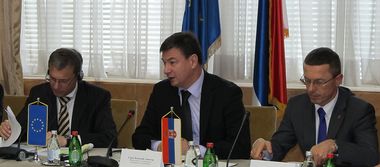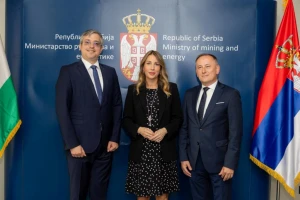- Serbia
Get to know Serbia
- Citizens
Culture and science
Health services
Pension and disability insurance
- Business
Employment
Economy
- Media
- Government
- Contact
Keep in touch
Contact form
Back
Keepin touch
Whether you have a question, comment, suggestion or any problem in the purview of the government, send us your message and we will try to respond as soon as possible. If your problem is not in our purview, we will forward your message to the relevant institution.
Q:
A:
Serbia advocates implementation of common EU agricultural policy
Belgrade,
27 March 2013
Minister of Agriculture, Forestry and Water Management Goran Knezevic stated today that Serbia invests great efforts to join the implementation of the common agricultural policy of the EU.
Speaking at the event marking the official end of the twinning project “Strengthening capacity of Serbia for accepting EU funds intended for rural development in pre-accession period”, Knezevic said that Serbia is creating a recognisable business environment, making deals on big investments, and working on the education of all actors in the agricultural production – from farmers, through those working in the agricultural and processing industry to civil servants.
The twinning project has been funded by the EU with €4.5 million and its goal is the formation of the IPARD agency and the governing body in accordance with EU requirements, preparation and implementation of a training plan for these two bodies, as well as assistance to Serbia in the EU integration process, the Minister explained.
Head of the EU Delegation to Serbia Vincent Degert pointed out that agriculture in Serbia is very important for the overall economy, adding that it accounts for 25% of total exports.
Degert said that the latest census in Serbia showed that 55% of the Serbian population lives in rural areas, which means that agriculture, directly or indirectly, is present in every family in Serbia.
The EU is aware of the importance of agriculture for Serbia and over the years it has supported Serbian agriculture systemically, he said and pointed out that the EU has been trying to influence the structural changes and modernisation of Serbian agriculture.
The Head of the EU Delegation to Serbia underlined that 52% of the total Serbian agricultural exports goes to the EU market, and last year that exchange amounted to €1.1 billion.
When it comes to food production, both Serbia and EU countries have similar challenges, among which is the one that people are looking for safety and quality and that requires confidence in agriculture, Degert said.
According to him, after the latest census in Serbia agriculture got a basis for further development because now all its assets are registered and this will facilitate the agricultural policy.
A further development of agriculture requires Serbia to harmonise its legislation with that of the EU, as well as greater transparency when it comes to the allocation of agricultural subsidies.
The twinning project "Strengthening capacity of Serbia for accepting EU funds intended for rural development in pre-accession period " was carried out from August 2010 to April 2013.
It has been jointly implemented by the Serbian Ministry of Agriculture, Forestry and Water Management, the Hungarian Agency for Agriculture and Ministry of Rural Development, the Austrian Agrarmarkt and Ministry of Agriculture, as well as the Ministry of Food, Agriculture and Forestry of Bavaria.
Hungarian Ambassador to Serbia Oscar Nikovic also took part in today’s event.
The twinning project has been funded by the EU with €4.5 million and its goal is the formation of the IPARD agency and the governing body in accordance with EU requirements, preparation and implementation of a training plan for these two bodies, as well as assistance to Serbia in the EU integration process, the Minister explained.
Head of the EU Delegation to Serbia Vincent Degert pointed out that agriculture in Serbia is very important for the overall economy, adding that it accounts for 25% of total exports.
Degert said that the latest census in Serbia showed that 55% of the Serbian population lives in rural areas, which means that agriculture, directly or indirectly, is present in every family in Serbia.
The EU is aware of the importance of agriculture for Serbia and over the years it has supported Serbian agriculture systemically, he said and pointed out that the EU has been trying to influence the structural changes and modernisation of Serbian agriculture.
The Head of the EU Delegation to Serbia underlined that 52% of the total Serbian agricultural exports goes to the EU market, and last year that exchange amounted to €1.1 billion.
When it comes to food production, both Serbia and EU countries have similar challenges, among which is the one that people are looking for safety and quality and that requires confidence in agriculture, Degert said.
According to him, after the latest census in Serbia agriculture got a basis for further development because now all its assets are registered and this will facilitate the agricultural policy.
A further development of agriculture requires Serbia to harmonise its legislation with that of the EU, as well as greater transparency when it comes to the allocation of agricultural subsidies.
The twinning project "Strengthening capacity of Serbia for accepting EU funds intended for rural development in pre-accession period " was carried out from August 2010 to April 2013.
It has been jointly implemented by the Serbian Ministry of Agriculture, Forestry and Water Management, the Hungarian Agency for Agriculture and Ministry of Rural Development, the Austrian Agrarmarkt and Ministry of Agriculture, as well as the Ministry of Food, Agriculture and Forestry of Bavaria.
Hungarian Ambassador to Serbia Oscar Nikovic also took part in today’s event.
-
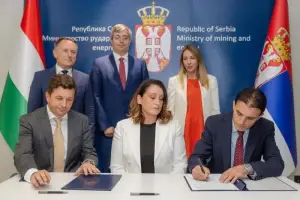 Belgrade, 2 July 2025
Belgrade, 2 July 2025Technical specifications defined for Serbia-Hungary oil pipeline
-
 Belgrade, 30 June 2025
Belgrade, 30 June 2025IMF confirms Serbia successfully implementing all agreed reforms
-
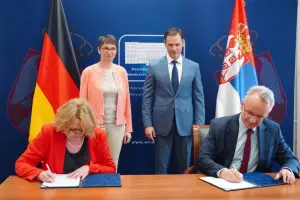 Belgrade, 27 June 2025
Belgrade, 27 June 2025Double Taxation Avoidance Agreement with Germany signed
-
 Kostolac, 25 June 2025
Kostolac, 25 June 2025Construction of Kostolac wind farm nearing completion
-
 Belgrade, 24 June 2025
Belgrade, 24 June 2025Government supports request for new postponement of sanctions against NIS
-
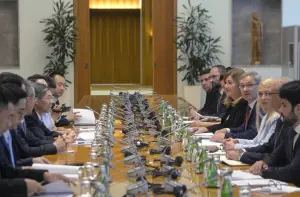 Belgrade, 23 June 2025
Belgrade, 23 June 2025Procedures to facilitate sale of Serbian products to China to be accelerated
-
 Belgrade, 21 June 2025
Belgrade, 21 June 2025Serbia receives first funds under Growth Plan for the Western Balkans
-
 Belgrade/Cairo, 20 June 2025
Belgrade/Cairo, 20 June 2025New phase in relations with Egypt in field of agriculture
-
 Belgrade/Athens, 18 June 2025
Belgrade/Athens, 18 June 2025Serbia’s leadership position in power sector

